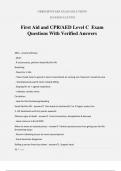-
1. Exam (elaborations) - St. john ambulance: cpr level c with aed exam questions with verified answers
-
2. Exam (elaborations) - First aid/cpr final exam questions with verified answers
-
3. Exam (elaborations) - First aid/cpr/aed test exam questions with verified answers.
-
4. Exam (elaborations) - American safety and health institute first aid exam questions with verified answers.
-
5. Exam (elaborations) - Adult and pediatric first aid, cpr, and aed exam review questions with verified answe...
-
6. Exam (elaborations) - The american red cross cpr questions with verified answers.
-
7. Exam (elaborations) - Cpr first aid test questions with verified answers.
-
8. Exam (elaborations) - Nsc cpr certification exam questions with verified answers.
-
9. Exam (elaborations) - First aid/cpr updated 2024 tests questions with verified answers.
-
10. Exam (elaborations) - Adult and pediatric first aid/cpr/aed (red cross) exam questions with verified answer...
-
11. Exam (elaborations) - Health- cpr/first aid questions + answers
-
12. Exam (elaborations) - First aid optional exam a ( 15 questions ) questions with verified answers.
-
13. Exam (elaborations) - Red cross: bls-sfat 2024 exam questions with verified answers.
-
14. Exam (elaborations) - Nsc adv. cpr - first aid (study questions ch. 1-11) exam questions with verified answ...
-
15. Exam (elaborations) - Chapter 17: first aid true or false
-
16. Exam (elaborations) - First aid/cpr/aed chapter 9 shock study questions with verified answers.
-
17. Exam (elaborations) - Post first responder first aid/cpr/aed: module 5 exam questions with verified answers...
-
18. Exam (elaborations) - American red cross first aid / cpr / aed instructor exam questions with verified answ...
-
19. Exam (elaborations) - First aid exam – aha exam questions with verified answers.
-
20. Exam (elaborations) - Ld 34 - first aid/ cpr exam questions with verified answers.
-
21. Exam (elaborations) - First aid and cpr chapters 1-4 exam questions with verified answers.
-
22. Exam (elaborations) - Cpr test: american heart association exam questions with verified answers.
-
23. Exam (elaborations) - Exs 261- first aid, cpr and aed final exam questions with verified answers.
-
24. Exam (elaborations) - Red cross: first aid/cpr exam questions with verified answers
-
25. Exam (elaborations) - Module 1—first aid, cpr, aed foundations exam questions with verified answers.
-
26. Exam (elaborations) - First aid and cpr/aed level c exam questions with verified answers
-
27. Exam (elaborations) - First aid/cpr exam 1 questions with verified answers
-
28. Exam (elaborations) - Standard first aid and cpr with aed level c exam questions with verified answers.
-
29. Exam (elaborations) - Emergency first aid + cpr level c + aed training exam questions with verified answers...
-
30. Exam (elaborations) - American red cross first aid, cpr, and aed (health packet answers) exam questions wit...
-
31. Exam (elaborations) - Cpr - hltaid012 exam questions with verified answers
-
32. Exam (elaborations) - Nsc first aid, cpr & aed exam questions with verified answers
-
33. Exam (elaborations) - The american red cross cpr quiz answers
-
34. Exam (elaborations) - Red cross cpr/aed/ first aid certification test questions with verified answers.
-
35. Exam (elaborations) - Cpr, aed, & basic first aid test questions with verified answers.
-
36. Exam (elaborations) - Standard first aid & cpr - online (red cross) exam questions with verified answers
-
37. Exam (elaborations) - Cpr, aed, first aid exam questions with verified answers
-
38. Exam (elaborations) - Standard first aid, cpr, and aed pre-test examination questions with verified answers
-
39. Exam (elaborations) - Cpr and first aid exam 2 questions with verified answers
-
40. Exam (elaborations) - Cpr/aed/first aid exam questions with verified answers
-
41. Exam (elaborations) - Cpr, aed, first-aid study guide questions with verified answers
-
42. Exam (elaborations) - First aid/cpr test review questions with verified answers
-
43. Exam (elaborations) - Cpr and first aid 40 questions with verified answers
-
44. Exam (elaborations) - Cpr test (25 questions) exam questions with verified answers
-
45. Exam (elaborations) - First aid/ cpr final exam review questions with verified answers
-
46. Exam (elaborations) - First aid & cpr final exam study guide - icc 2024 exam questions with verified answer...
-
Show more




